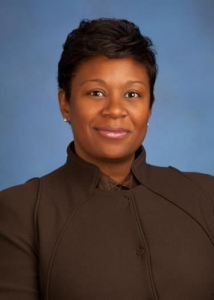 By Melissa J. Anderson (New York City)
By Melissa J. Anderson (New York City)
As Global head of Diversity and Inclusion at Credit Suisse, Michelle Gadsden-Williams says she is the person ultimately responsible for ensuring the Bank fulfills its commitment to building a culture of inclusion for high-performing, engaged, diverse employees. She explained, “Early in my career, I found the subject of diversity to be extremely powerful on a number of levels.”
She continued, “Diversity is strategically important for a number of reasons. It provides organizations with the opportunity to attract, develop, and retain the best talent, creates an inclusive culture for employees to thrive and, most importantly, addresses the needs and wants of a diverse customer base. There aren’t many positions that can have an impact across the critical areas of talent, culture, and customers.”
Gadsden-Williams spent more than 17 years working in the pharmaceutical industry and several years in the consumer goods industry before transitioning to her current role in financial services. She began her career working in product development and marketing then pursued a career in human resources a few years later. She transitioned to Merck & Co., assuming various positions of increased responsibility in human resources. She joined Novartis Pharmaceuticals in 2002 and became the Vice President and Global Chief Diversity Officer before joining Credit Suisse in January of 2011.
She recalled, “I spent a good portion of my career in the pharmaceutical industry and got to know the industry extremely well. I knew that if I wanted to continue to stretch, grow and develop as a Chief Diversity Officer, I would have to step outside of my comfort zone and purse the work that I love in another industry. “
“Credit Suisse is a company that I have always respected and one I was familiar with living and working in Switzerland. When the opportunity presented itself to join Credit Suisse, it was not a hard decision to make the transition,” she continued.
One of Gadsden-Williams’ proudest moments was receiving the 2010 Leadership in Diversity Award from the See Forever Foundation and Maya Angelou Public Charter Schools in the presence of two women that she idolized and held in high regard, Dr. Maya Angelou and Dr. Dorothy I. Height.
“I received the award in the presence of two of my heroines, the incomparable Dr. Maya Angelou and Dr. Dorothy Height. Unfortunately, Dr. Height, a highly regarded social activist, passed away two weeks after I received the award. Dr. Angelou is a national treasure in the United States and a global icon but a renowned and revered voice of our time. I have had the grand opportunity to meet her on several occasions through my work in diversity over the years. Every time I am in her presence, I am humbled by her wisdom, her strength, and her ability to make each individual that she encounters feels special,” she said.

 By Hua Wang (Kansas City)
By Hua Wang (Kansas City) By Jacey Fortin (New York City)
By Jacey Fortin (New York City) By Melissa J. Anderson (New York City)
By Melissa J. Anderson (New York City) Contributed by Curt Rice
Contributed by Curt Rice By Melissa J. Anderson (New York City)
By Melissa J. Anderson (New York City) By Sophie Fletcher (Chicago)
By Sophie Fletcher (Chicago)
 By Melissa J. Anderson (New York City)
By Melissa J. Anderson (New York City) “I learned the importance of sponsorship along the way,” said
“I learned the importance of sponsorship along the way,” said